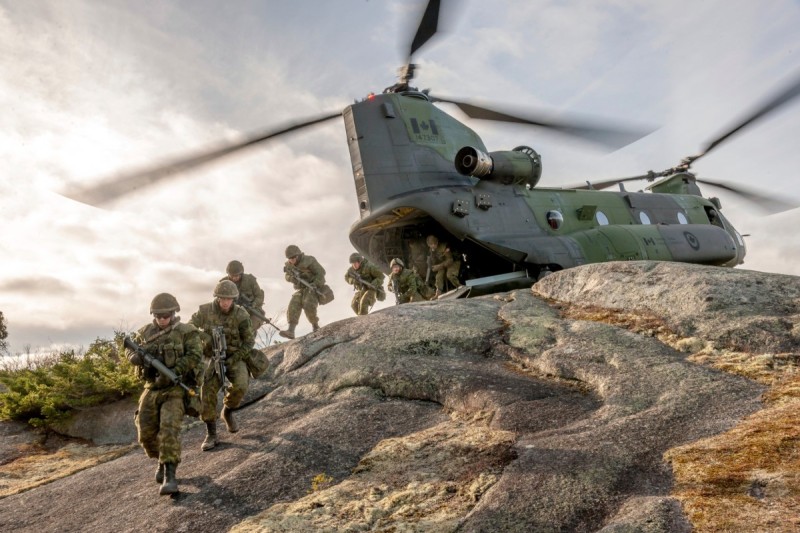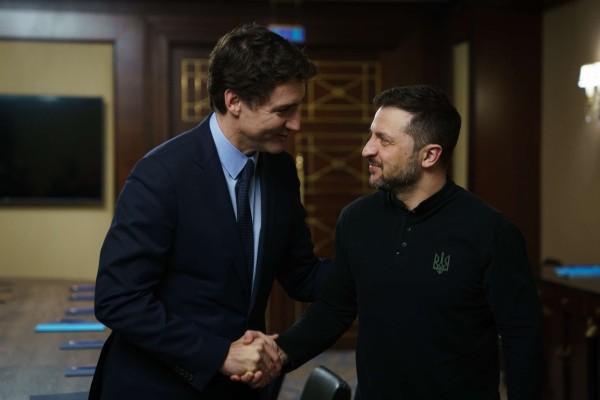Military spending groupthink and Canada’s left
We are sleepwalking down a road toward significant hikes in defence spending that will come back to haunt us for decades to come

Photo by Captain Greg Juurlink/Canadian Armed Forces/Facebook
I recently listened to a report on CBC Radio about Canada and NATO military expenditure—hardly a new topic because the Canadian population is apparently now being primed regularly for increased military spending. This particular report wasn’t unusual; it made typical claims through a combination of one-sided reporting reinforced with selective bits of audio from the usual ‘hawks’ that a dramatic increase in military spending is very much needed. This imperative is now often presumed to be self-evident, although towards the end of this particular segment it was spelled out by one of the interviewees, in case people needed a reminder, that Russia is out to get ‘us’—the ‘us’ being NATO members. When further fear mongering is necessary China, North Korea and Iran can be brought into the picture.
Just how Russia is gunning for Canada and NATO isn’t ever explained, because any explanation would sound too ridiculous. For NATO members in Europe, mere proximity to Russia is taken as reason to fear it. Just what they are fearing is unclear. Russian troop levels on their borders are clearly not high as any reasonable open-source assessment will attest. Whatever combat-ready Russian forces (as opposed to residual and training elements at home bases) are present is arguably a response to NATO forces being deployed to Russia’s border, such as in Operation Reassurance in Latvia, involving a brigade-sized NATO ground force in which Canada currently has 1,900 troops deployed, with plans for 2,200 troops by 2026.
In the rare instances that the notion of a current Russian military threat in Europe is challenged, it is typically suggested that if the West allows Russia to ‘win’ in Ukraine then in the aftermath of such a victory Russia will turn its attention to the West. Why Russia would do that is unclear given the fact that even without any increases in defence expenditure NATO members collectively possess not only overwhelming conventional strength but also nuclear weapons. Without any additional mobilization NATO forces have considerably more than double Russia’s personnel strength, more than quadruple its airpower and perhaps double the number of tanks. These forces are backed by a combined economic power that dwarfs that of Russia. In terms of nuclear weapons NATO members have a similar number of warheads to Russia, not that counting matters after a certain point because both sides possess the potential to destroy the other even in the event of an opponent’s first strike, leaving humanity’s continued existence in doubt. NATO could concentrate on organizing its existing capabilities better to maximize combat potential, rather than spending considerably more money.
In the Canadian case, a nebulous notion of Russian activity in the Arctic is usually wheeled out to substantiate the idea that Russia poses a danger to Canada, once again without any clarification. In an immediate sense Russia has clearly stripped many of its ground forces from the north for operations in Ukraine, and the idea that they might be offensively deployed to threaten Canada in co-operation with the Russian navy at any point in time hardly warrants serious consideration. It was an in-joke amongst Canadian Arctic specialists that any such operations would end up being a massive search-and-rescue operation, although such jokes seem to be made less often these days, presumably because making them would highlight the absurdity of the notion of a Russian threat to the Canadian Arctic.
The idea that Russia—bogged down in a protracted war with a Ukraine already backed by billions of dollars of Western assistance—would attack NATO with conventional forces in Europe is similarly dubious. There simply isn’t any evidence of Russian intent. A lack of credible evidence, however, doesn’t stop the usual suspects, including NATO officials and former generals, from suggesting that the West better watch out.
We should expect such nonsense from former generals and NATO officials, and apparently most of the major European governments and political parties are on side with it. In the Canadian context, both the Conservatives and Liberals back such notions to the hilt even if stumping up the cash might be a somewhat different matter. Even the NDP—before it became essentially powerless in Parliament—was so frightened of being accused of not being tough on the ‘bad guys’ that talk of increased defence expenditure by the other parties went by with barely a murmur.
In contemporary Canada, and indeed across much of Europe, the ‘hawks’ are of course supported by the defence industry. In the West, the wider military-industrial complex is a powerful beast, and jobs in the defence sector—or at least the lure of them—will be a nice sweetener for MPs who might have doubts about actually increasing defence spending rather than just talking about it. Just how many jobs increased defence expenditure will provide in Canada is however a burning question. A recent piece in the Financial Post doesn’t question the need for the expenditure, but does interrogate whether that expenditure will translate into Canadian jobs. The article cites two RBC economists, who note that in a Canadian context the impact of defence spending as an economic multiplier tends to be high for intellectual property but low for “machinery and equipment… given its high import content,” meaning that Canada doesn’t make most of the stuff it buys for its military. Prime Minister Mark Carney can claim this will change, but there are limits to what can be achieved within an economy the size of Canada’s with a far from significant defence sector of its own.
The vast majority of Western politicians have boxed themselves into too much of a corner after having demonized Russia to such an extent to really raise serious questions about the need for increased defence expenditure and to question any benefits it might bring. At a certain point, politically, there isn’t any going back without a colossal loss of face, but there’s no evidence that most want to question it anyway. Politicians are one thing, however, but we really have reason to worry when the groupthink is so strong that barely a journalist will question whether significant increases in military spending are justified or think critically about what Canada really needs.
The aforementioned radio segment did not question the need for Canada to spend two percent or more of GDP on defence; not a single voice was even raised to ask where the money would come from. We all know it won’t come from widespread tax increases, because they have become such a taboo in Western politics, and the savings through efficiencies argument is running out of the limited steam it had in the first place. The money will, inevitably come primarily from trimming things that really matter to Canadians like health, education and social programs.
Foreign aid is of course a soft target for cuts. British Prime Minister Keir Starmer has opened the floodgates to the idea of cutting foreign aid to fund defence by openly committing to do just that in the UK. However, in the Canadian context the money spent on foreign aid won’t buy many submarines to fight off the imaginary Russian threat in the Arctic.
During my more than two decades in Canada there has periodically been talk of increased defence spending. It would be easy to assume that, if the past is anything to go on, such talk will typically not translate into actual expenditure. Nonetheless, the Trudeau government’s eventual commitment to the F-35 program started a ball rolling, where too few questions were raised—in that instance about whether what Canada actually needed was the overly complex and expensive F-35 over the cheaper and arguably more suitable SAAB Gripen.
The threat of meaningful increases in Canadian defence expenditure is very real this time around, and particularly as long as the war in Ukraine continues. Most European and Canadian politicians and journalists seem unwilling to face the realities on the ground in Ukraine and want to see the war continue into the foreseeable future, regardless of how many Ukrainian lives their stand against Russia will claim. In failing to challenge the established narrative, the Canadian left is sleepwalking down a road towards significant hikes in military spending that will come back to haunt it for decades to come.
Professor Alexander Hill teaches at the University of Calgary, and is a leading expert on the military and political history of Russia and the Soviet Union since 1917.










